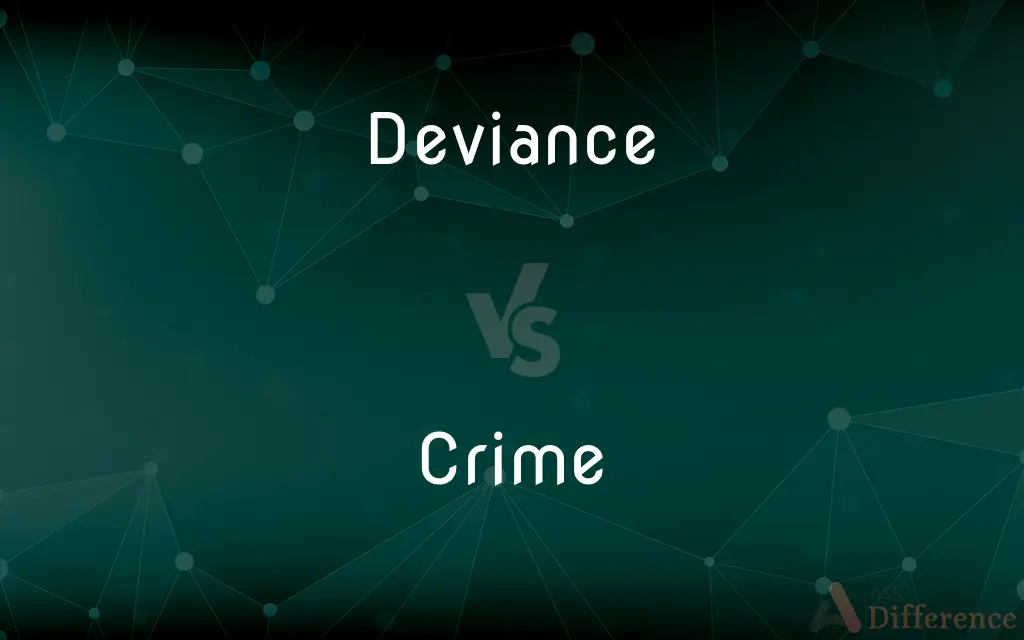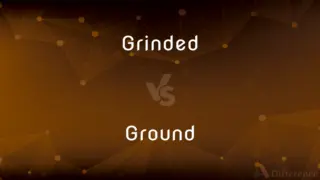Deviance vs. Crime — What's the Difference?
By Tayyaba Rehman & Urooj Arif — Updated on March 16, 2024
Deviance involves behavior that violates social norms, while crime specifically breaks laws.

Difference Between Deviance and Crime
Table of Contents
ADVERTISEMENT
Key Differences
Deviance encompasses actions that defy societal norms and expectations, not necessarily laws, indicating a broader concept that includes non-criminal acts. Crime, however, is defined as conduct that is not only contrary to societal norms but also violates formal legal statutes, resulting in legal sanctions. This distinction is crucial for understanding the relationship between societal norms and legal systems.
While all crimes are considered deviant, not all deviant behaviors are classified as crimes. For instance, choosing an unconventional lifestyle or flouting social etiquette falls under deviance without necessarily being unlawful. On the other hand, theft or assault constitutes both deviance and crime due to their legal prohibitions.
The perception of what constitutes deviance or crime can vary significantly across cultures and historical periods. What is considered deviant in one society or era may be normalized or even celebrated in another, and similarly, legal definitions of crime can change over time. This variability underscores the influence of societal values and legal systems on these concepts.
The social response to deviance and crime also differs. Deviant behavior might attract social stigma or informal sanctions such as ridicule or ostracism, whereas crime typically results in formal legal consequences, including fines, imprisonment, or other penalties as determined by the judicial system.
The study of deviance and crime is fundamental to the fields of sociology and criminology, respectively. Sociologists examine the societal constructs that define deviance, exploring its causes and consequences, while criminologists focus on the legal and institutional responses to crime, aiming to understand its prevention and control.
ADVERTISEMENT
Comparison Chart
Definition
Behavior that violates social norms.
Behavior that violates legal statutes.
Scope
Broader, includes non-criminal acts.
Narrower, limited to legally defined offenses.
Legal Consequences
None directly; may attract social sanctions.
Legal penalties, such as fines or imprisonment.
Social Response
Social stigma, ridicule, ostracism.
Formal legal action, correctional measures.
Examples
Unconventional dress, skipping social events.
Theft, murder, fraud.
Compare with Definitions
Deviance
Behavior that diverges from societal norms.
Wearing extravagant outfits in a conservative setting.
Crime
Offenses that result in legal prosecution.
Driving under the influence of alcohol.
Deviance
Acts that challenge accepted social standards.
Choosing not to marry or have children.
Crime
Actions constituting a breach of law.
Committing burglary.
Deviance
Situations invoking social sanctions without legal implications.
Being ostracized for unpopular opinions.
Crime
Behaviors leading to formal penalties.
Vandalism leading to arrest and fines.
Deviance
Nonconformity to cultural expectations.
Refusing to participate in national holidays.
Crime
Acts deemed harmful to society and individuals.
Fraudulent schemes.
Deviance
Varied based on cultural context.
Tattoos might be considered deviant in some cultures but not in others.
Crime
Defined by statutory codes and regulations.
Cybercrime being recognized with technological advancement.
Deviance
Differing from a norm or from the accepted standards of a society.
Crime
In ordinary language, a crime is an unlawful act punishable by a state or other authority. The term crime does not, in modern criminal law, have any simple and universally accepted definition, though statutory definitions have been provided for certain purposes.
Deviance
One that differs from a norm, especially a person whose behavior and attitudes differ from accepted social standards.
Crime
An act committed in violation of law where the consequence of conviction by a court is punishment, especially where the punishment is a serious one such as imprisonment.
Deviance
(sociology) Actions or behaviors that violate formal and informal cultural norms such as laws and customs.
Crime
Unlawful activity
Statistics relating to violent crime.
Deviance
A person or thing that differs from the expected. en
Crime
A serious offense, especially one in violation of morality.
Deviance
An aberrant state or condition.
Crime
An unjust, senseless, or disgraceful act or condition
It's a crime to waste all that paper.
Deviance
Deviate behavior.
Crime
(countable) A specific act committed in violation of the law.
Deviance
A state or condition markedly different from the norm
Crime
(countable) Any great sin or wickedness; iniquity.
Deviance
Deviate behavior
Crime
That which occasions crime.
Crime
(uncountable) Criminal acts collectively.
Crime
(uncountable) The habit or practice of committing crimes.
Crime doesn’t pay.
Crime
To subject to disciplinary punishment.
Crime
(nonce word) To commit crime.
Crime
Any violation of law, either divine or human; an omission of a duty commanded, or the commission of an act forbidden by law.
Crime
Gross violation of human law, in distinction from a misdemeanor or trespass, or other slight offense. Hence, also, any aggravated offense against morality or the public welfare; any outrage or great wrong.
Crime
Any great wickedness or sin; iniquity.
No crime was thine, if 'tis no crime to love.
Crime
That which occasion crime.
The tree of life, the crime of our first father's fall.
Crime
(criminal law) an act punishable by law; usually considered an evil act;
A long record of crimes
Crime
An evil act not necessarily punishable by law;
Crimes of the heart
Common Curiosities
Why do definitions of crime and deviance vary across cultures?
Cultural values, traditions, and legal systems differ significantly, leading to varied perceptions and definitions of what constitutes crime and deviance.
How do societal norms influence what is considered deviant or criminal?
Societal norms dictate the moral and ethical boundaries of behavior, shaping the legal framework that defines crime and the social context that determines deviance.
What role do social institutions play in defining deviance and crime?
Social institutions like the family, education system, and legal system play crucial roles in establishing norms and laws that define deviance and crime.
How do criminologists differentiate between deviant behavior and criminal acts?
Criminologists consider the legal status of the behavior, focusing on acts that violate laws for their studies, while also considering the societal context of deviance.
Why is not all deviance considered a crime?
Deviance encompasses a broader range of behaviors that violate societal norms, not all of which are codified into law.
Can legal actions change societal perceptions of deviance?
Yes, changes in law can influence social norms and attitudes, either by legitimizing certain behaviors or by highlighting their negative implications.
How do personal beliefs affect perceptions of deviance and crime?
Individual beliefs and values can influence what one considers deviant or criminal, often reflecting broader societal and cultural norms.
Can a behavior be a crime without being deviant?
Rarely, as crimes inherently violate societal norms, but perceptions of deviance can change, potentially making certain crimes seem less deviant over time.
Are the consequences for deviance always less severe than for crime?
Generally, yes, because crime involves legal penalties, whereas deviance may result in social sanctions that vary in severity.
What is the impact of globalization on the concepts of deviance and crime?
Globalization can lead to a more interconnected and complex understanding of deviance and crime, as global norms and legal standards increasingly influence local cultures and laws.
How does public opinion shape the enforcement of laws against certain crimes?
Public opinion can influence law enforcement priorities and the severity of penalties for certain crimes, reflecting societal values and concerns.
How does time affect the concepts of deviance and crime?
Societal norms and legal standards evolve, so behaviors considered deviant or criminal can change over time.
Is it possible for an act of deviance to become a crime over time?
Yes, if societal values shift such that the act is deemed harmful enough to warrant legal prohibition.
Can reform or changes in law make a crime into a non-criminal act?
Yes, legal reforms can decriminalize certain acts, removing them from the category of crime but not necessarily from that of deviance.
Why is the study of deviance important in sociology?
Studying deviance helps sociologists understand the mechanisms of social control, the construction of social norms, and the boundaries of acceptable behavior.
Share Your Discovery

Previous Comparison
Fat vs. Overweight
Next Comparison
Grinded vs. GroundAuthor Spotlight
Written by
Tayyaba RehmanTayyaba Rehman is a distinguished writer, currently serving as a primary contributor to askdifference.com. As a researcher in semantics and etymology, Tayyaba's passion for the complexity of languages and their distinctions has found a perfect home on the platform. Tayyaba delves into the intricacies of language, distinguishing between commonly confused words and phrases, thereby providing clarity for readers worldwide.
Co-written by
Urooj ArifUrooj is a skilled content writer at Ask Difference, known for her exceptional ability to simplify complex topics into engaging and informative content. With a passion for research and a flair for clear, concise writing, she consistently delivers articles that resonate with our diverse audience.














































